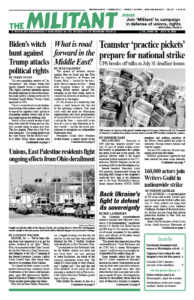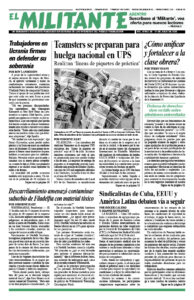The U.S. Supreme Court in a 6-3 vote June 30 ruled that a Colorado commercial website designer has the right under the First Amendment — which protects free speech from government interference — to refuse to endorse messages she disagrees with. This is an important victory for working people.
The case involves Lorie Smith, who runs her own business, 303 Creative, in the city of Littleton. In addition to graphic design and social media services, she began organizing a project to create websites for couples planning their weddings. While providing services to customers regardless of their race, creed, sex or sexual orientation, Smith drew a line at being forced by state law to design anything that could make it appear she espoused ideas she did not hold.
She believes that marriage is a union between one man and one woman and sued so she would not be forced to do anything that would indicate she opposed that view.
Concerned that she would face prosecution under Colorado’s far-reaching Anti-Discrimination Act, Smith filed a preemptory lawsuit in 2016 in federal district court seeking an injunction to prevent the state from forcing her to create wedding websites celebrating marriages that contradict her views.
The Colorado law bars discrimination on the basis of sexual orientation in public accommodations, like housing and transportation. Penalties under this law are far-reaching, including fines for each violation as well as being forced to undergo mandatory state educational programs and submitting ongoing compliance reports to state officials. Both state authorities or private citizens may bring actions to enforce the law.
The district court ruled against Smith, as did the United States Court of Appeals for the Tenth Circuit Court. She appealed to the Supreme Court.
In 2018 the High Court had ruled on a similar case, in favor of Colorado Masterpiece Cakeshop owner Jack Phillips. He had refused to create a cake for a same-sex couple because of his religious beliefs. But the ruling didn’t address the free speech questions posed, sending the case back to lower courts for further consideration.
‘Free to speak, not as gov’t demands’
In the majority opinion for the court in Smith’s case, Justice Neil Gorsuch wrote for the majority, “The First Amendment envisions the United States as a rich and complex place where all persons are free to think and speak as they wish, not as the government demands.” Both sides in the case had agreed the websites Smith creates “express” her message.
Holding the key issue at hand was constitutionally protected free speech, Gorsuch’s ruling expressly differentiated it from an earlier ruling that barred employers’ from discriminating against gays and lesbians in employment and promotions. In a 2020 ruling that Gorsuch also wrote, the majority held the 1964 Civil Rights Act bars any such discrimination.
In a dissenting opinion in the Colorado case, Justice Sonia Sotomayor, joined by Justices Elena Kagan and Ketanji Brown Jackson, wrote the ruling was “a backlash to the movement for liberty and equality for gender and sexual minorities,” claiming it was a “message that we live in a society with social castes.”
Gorsuch wrote, “A commitment to speech for only some messages and some persons is no commitment at all. By approving a government’s effort to ‘eliminate’ disfavored ‘ideas,’ today’s dissent is emblematic of an unfortunate tendency by some to defend First Amendment values only when they find the speaker’s message sympathetic.”
The ruling points to the importance of earlier decisions barring discrimination in places of public accommodation. These were won through working-class struggles like the Black-led civil rights battles of the 1950s and ’60s that transformed the attitudes of millions.
“At the same time,” the ruling noted, Colorado has expanded its definition of “public accommodations.” “[T]his Court has held, public accommodations statutes can sweep too broadly when deployed to compel speech.” It said, “When a state public accommodations law and the Constitution collide, there can be no question which must prevail.”
Kristen Waggoner, an attorney for Alliance Defending Freedom, which helped bring the case, told the Wall Street Journal, “Disagreement isn’t discrimination, and the government can’t mislabel speech as discrimination to censor it.”
Also on June 29, the Supreme Court ruled unanimously that postal worker Gerald Groff, an evangelical Christian, should be allowed to have Sundays off to observe his religious faith. Groff said he had been forced to quit his job because the Postal Service kept scheduling him to work Sundays to deliver Amazon packages. He filed a lawsuit under Title VII of the Civil Rights Act of 1964. The decision is a gain for working people, who should find it easier to keep their jobs without boss interference with their religious beliefs.


